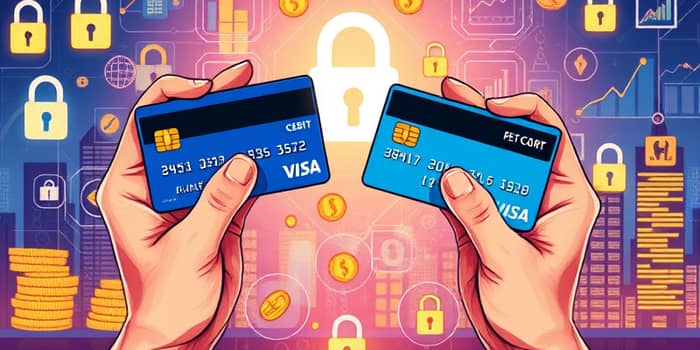In the evolving landscape of personal finance, selecting the right payment method has never been more critical. Whether you’re aiming to build credit, control spending, or maximize rewards, understanding the nuances between debit and credit cards empowers you to make informed decisions in 2025 and beyond.
Understanding How Each Card Works
Directly linked to your bank account, a debit card deducts funds instantly with every purchase. It relies solely on your available balance—there is no borrowing involved. You can spend only what you have, which fosters strict budgeting habits for many consumers.
Conversely, a credit card offers a revolving line of credit up to a pre-approved limit. Your issuer fronts the money for purchases, and you receive a consolidated bill at the end of each statement cycle. You can choose to repay this balance in full or carry it forward—with interest.
Security and Fraud Protection
When it comes to fraud safeguards, credit cards generally lead the way. Federal law caps your liability for unauthorized charges at fifty dollars maximum per cardholder. Many issuers offer zero liability if fraud is reported, and your actual cash assets remain untouched during investigations.
Debit cards now feature EMV chip technology and real-time alerts, driving an eighteen percent drop in fraud rates over five years. Still, if a debit card is compromised, your personal bank balance can be drained and frozen—often for weeks—before reimbursement arrives.
Chargeback rights further distinguish credit cards. They facilitate swift dispute resolution and buyer protection for online transactions. Debit recoveries, by contrast, can be slow and sometimes uncertain.
Fees, Costs, and Financial Implications
Debit cards usually impose minimal fees. The primary charges include overdraft fees and out-of-network ATM fees. There is no interest to accrue, making them an economical option for everyday spending.
Credit cards come with a broader fee structure: annual fees, late payment fees, balance transfer fees, and interest on carried balances—now averaging twenty-one point three percent annually in 2025. While some cards waive annual fees, others justify them with premium travel perks or generous rewards programs.
Rewards and Benefits Comparison
Rewards are the hallmark of credit cards. Consumers can earn cash back, travel miles, retail discounts, and complimentary insurance coverage. Many issuers bundle purchase protection and extended warranties for high-value goods.
In contrast, debit cards seldom offer rewards. Their value proposition lies instead in simplicity and immediate fund access.
Impact on Credit Score and History
Responsible credit card use can build a positive credit history—crucial for securing mortgages, auto loans, and competitive interest rates. Conversely, missed or late payments can damage your score and linger on your report for up to seven years.
Debit cards do not appear on credit reports. They neither help nor harm your credit score, making them a safe tool for disciplined spenders who prioritize immediate accountability over future borrowing capacity.
Spending Control and Debt Management
Debit cards encourage a “spend what you have” mentality. Sixty-seven percent of debit users cite debt avoidance as their main preference driver. With no credit line to tempt overspending, you can manage monthly budgets more predictably.
Credit cards, by contrast, carry the inherent risk of building unwanted debt. U.S. total credit card debt has climbed to one point two trillion dollars in 2025. To avoid high interest charges, set balance alerts, automate payments, and never pay only the minimum due.
Generational Trends and Consumer Preferences
Consumer choice varies significantly across age groups. Here’s how U.S. generations align in 2025:
Overall, 85% of U.S. consumers maintain a debit card linked to their primary checking account. The average debit cardholder completes 35 transactions monthly, spending around $1,600.
When and How to Use Your Cards
- Use a credit card for online shopping, large purchases, and travel bookings to leverage chargeback rights and travel insurance.
- Tap a debit card for daily expenses, ATM withdrawals, and situations requiring strict adherence to your budget.
- Combine both cards: deploy credit for rewards and protections, and debit for routine, cash-based spending.
Best Practices for Responsible Card Usage
- Set up real-time transaction alerts to help users monitor every swipe, dip, or tap.
- Automate statement payments to avoid costly interest and late fees.
- Review monthly statements carefully to detect unauthorized charges early.
Risks and Mitigation Strategies
Credit cards carry the risk of overspending and high interest accumulation if balances are not paid promptly. Debit cards risk overdraft fees and the temporary loss of access to your cash during fraud investigations.
Mitigate these risks by establishing clear budgets, leveraging banking and card issuer tools, and maintaining an emergency fund. Always report suspicious activity immediately to minimize liability and expedite resolutions.
Ultimately, a balanced approach—leveraging the added consumer protections and reward potential of credit cards, alongside the strict spending discipline of debit cards—can help you navigate the complex payments ecosystem with confidence and control.
Evaluate your financial goals, spending habits, and risk tolerance to choose the right combination of cards. In 2025’s dynamic environment, informed choices lead to smarter, safer, and more rewarding financial journeys.
References
- https://www.joinkudos.com/blog/credit-card-vs-debit-card-which-should-you-use-in-2025
- https://monefy.com/article/credit-card-vs-debit-card-which-is-better
- https://energyone.org/2025/01/19/debit-card-vs-credit-card-key-differences/
- https://www.clearlypayments.com/blog/debit-vs-credit-which-payment-method-do-consumers-prefer-in-2025/
- https://www.sbical.bank/education-center/debit-cards-vs-credit-cards-key-differences
- https://dollar.bank/be-dollar-wise/august-2025/debit-cards-vs-credit-cards-key-differences-and-benefits
- https://www.memberspluscu.org/blog/2025/04/debit-card-vs-credit-card-the-smarter-choice-for-young-adults/
- https://coinlaw.io/credit-card-vs-debit-card-statistics/










